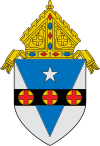Francis James Furey
 From Wikipedia the free encyclopedia
From Wikipedia the free encyclopedia
Francis James Furey | |
|---|---|
| Archbishop of San Antonio titular bishop of Temnus | |
| Church | Roman Catholic Church |
| See | Archdiocese of San Antonio |
| Installed | May 13, 1969 |
| Term ended | April 23, 1979 |
| Predecessor | Robert Emmet Lucey |
| Successor | Patrick Flores |
| Other post(s) | Bishop of San Diego (1966–1969) Coadjutor Bishop of San Diego (1963–1966) Auxiliary Bishop of Philadelphia (1960–1963) |
| Orders | |
| Ordination | March 15, 1930 by Basilio Pompili |
| Consecration | December 22, 1960 by Egidio Vagnozzi |
| Personal details | |
| Born | February 22, 1905 |
| Died | April 23, 1979 (aged 74) San Antonio, Texas, US |
| Education | St. Charles Borromeo Seminary Pontifical Roman Major Seminary |
Francis James Furey (February 22, 1905 – April 23, 1979) was an American prelate of the Roman Catholic Church.
He served as auxiliary bishop of the Archdiocese of Philadelphia in Pennsylvania from 1960 to 1863, as bishop of the Diocese of San Diego in California from 1966 to 1969 and as archbishop of the Archdiocese of San Antonio in Texas from 1969 to 1979.
| Styles of Francis James Furey | |
|---|---|
 | |
| Reference style | The Most Reverend |
| Spoken style | Your Excellency |
| Religious style | Monsignor |
| Posthumous style | not applicable |
Biography
[edit]Early life
[edit]The eldest of five children, Francis Furey was born on February 22, 1905, in Summit Hill, Pennsylvania, to John and Anna (née O'Donnell) Furey.[1] After attending public schools in Coaldale, Pennsylvania, he graduated from St. Mary's High School in 1920 as valedictorian.[2] Furey then attended St. Charles Borromeo Seminary in Overbrook, Pennsylvania, for four years. He then traveled to Rome to enter the Pontifical Roman Seminary, from where he received a Doctor of Philosophy degree in 1926 and a Doctor of Sacred Theology degree in 1930.[1][3]
Priesthood
[edit]Furey was ordained to the priesthood by Cardinal Basilio Pompili on March 15, 1930.[4] Following his return to Pennsylvania, he served as private secretary to Cardinal Dennis Dougherty.[5] Furey was appointed in 1936 as president of Immaculata College in East Whiteland Township, Pennsylvania. He left Immaculata College in 1946 to become rector of St. Charles Borromeo Seminary.[5] He was named a domestic prelate in 1947.[1] In 1958, Furey left his position as rector to became pastor of St. Helena's Parish in Philadelphia.[1]
Auxiliary Bishop of Philadelphia
[edit]On August 17, 1960, Furey was appointed as an auxiliary bishop of the Archdiocese of Philadelphia and titular bishop of Temnus by Pope John XXIII.[4] He received his episcopal consecration on December 22, 1960, from Archbishop Egidio Vagnozzi, with Bishops Joseph McShea and Joseph McCormick serving as co-consecrators.[4]
Coadjutor Bishop and Bishop of San Diego
[edit]Pope Paul VI appointed Furey as coadjutor bishop of the Diocese of San Diego on July 21, 1963.[4] After the death of Bishop Charles F. Buddy on March 5, 1966, Furey automatically succeeded him as bishop.[4] He served on the administrative tribunal of the Second Vatican Council in Rome from 1962 to 1965.[5]
Archbishop of San Antonio
[edit]On May 23, 1969, Furey was appointed as the third archbishop of the Archdiocese of San Antonio by Paul VI.[4] After his installation, Furey decided not to move into the large bishop's residence, choosing instead a two-room apartment in a poor part of the city.[3]
Furey established one of the first diocesan commissions for Mexican American affairs in the United States, and promoted the candidacy in 1970 of Reverend Patrick Flores as the first Mexican American bishop in the country.[5][3] Furey was an outspoken supporter of Communities Organized for Public Service, a community organizing group in San Antonio.[5][3] He also supported the Farah strike (October 1973) and the lettuce boycotts of the Texas Farm Workers Union.[5] He held various offices within the National Conference of Catholic Bishops, including chair of the Committee for the Campaign for Human Development.[5]
Furey was chaplain of the Texas State Council of the Knights of Columbus, bishop protector of the Catholic War Veterans of the U.S.A., and appointed by Texas Governor Preston Smith to the John F. Kennedy Memorial Commission.[5] He was an honorary member of the United States Marine Corps, and received honorary degrees from La Salle College, St. Joseph College, Villanova University, St. John's University, Brooklyn, New York; Mount St. Mary's University, and Our Lady of the Lake University.[5]
Death and legacy
[edit]Francis Furey died of cancer in San Antonio on April 23, 1979, at age 74.[3] He was buried in Holy Cross Cemetery in San Antonio.[5]
References
[edit]- ^ a b c d Curtis, Georgina Pell (1961). The American Catholic Who's Who. Vol. XIV. Grosse Pointe, Michigan: Walter Romig.
- ^ "St. Mary's and Marian". Coaldale High School Alumni.
- ^ a b c d e Briggs, Kenneth A. (1979-04-25). "Archbishop Francis James Furey". The New York Times. ISSN 0362-4331. Retrieved 2022-07-29.
- ^ a b c d e f "Archbishop Francis James Furey". Catholic-Hierarchy.org.[self-published source]
- ^ a b c d e f g h i j "FUREY, FRANCIS JAMES (1905-1979)". Handbook of Texas Online.
5. Francis James Furey's Niece Dolores Fennell

